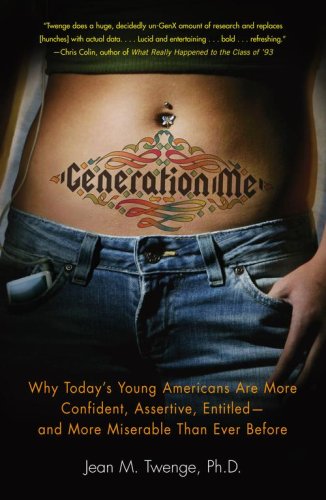All Nonfiction
- Bullying
- Books
- Academic
- Author Interviews
- Celebrity interviews
- College Articles
- College Essays
- Educator of the Year
- Heroes
- Interviews
- Memoir
- Personal Experience
- Sports
- Travel & Culture
All Opinions
- Bullying
- Current Events / Politics
- Discrimination
- Drugs / Alcohol / Smoking
- Entertainment / Celebrities
- Environment
- Love / Relationships
- Movies / Music / TV
- Pop Culture / Trends
- School / College
- Social Issues / Civics
- Spirituality / Religion
- Sports / Hobbies
All Hot Topics
- Bullying
- Community Service
- Environment
- Health
- Letters to the Editor
- Pride & Prejudice
- What Matters
- Back
Summer Guide
- Program Links
- Program Reviews
- Back
College Guide
- College Links
- College Reviews
- College Essays
- College Articles
- Back
Generation Me
As a young 18 year old American who fit the described of Dr. Jean M. Twenge's subtitile of her book Generation Me, I just had to find out what she had to say.
Twenge pursues the task of describing and defining Generation Me, children born from Baby Boomers from 1970 to the present. Although one of Generation Me's main characteristics is being diverse and apart from the social norms, we are similar in that we focus on the individual, a characteristic begun by the Baby Boomers.
Throughout the book it was shocking how many of the generalizations about Generation Me proved true among my friends, family, and me. We see work as a path to fulfillment rather than stability; we believe that by doing things our own way we can have it all while following our dreams; we respect social norms and authority as long as they do not impede our path; we view our 20s as the years to live life and experience the world; we care more about how we feel about ourselves than how others feel about us. However, Twenge never seems to take a one sided position on everything, but lets her years of research and statistics speak for her, which are usually highly convincing.
Throughout her analysis of Generation Me, Twenge defines what Generation Me really is, constantly supporting her position with solid data, descriptive quotes, and frequent examples from media. She explains how the need for little social approval and the defiance of authority brought about by the boomers were amplified and introduced into everyday life to Generation Me through media. Twenge also neatly analyzes the narcissistic self-esteem of Generation Me with data from statistics all the way to quotes. Throughout the book, Twenge's research and conclusions constantly made me think about myself, my friends, my family, past generations and how we all greatly differ on so many cultural and mental aspects.
Generation Me is an interesting and straightforward read. Each chapter starts by describing what aspect of the generation it will investigate, then proceeds with logical statistics, quotes, and stories to reflect that aspect. However, Twenge's description of Generation Me goes slightly over the edge by frequently describing it as miserable, which would infer that there is no possible fix. Generation Me does have to face unwelcoming obstacles, but so has every other generation before it, and referring to an entire generation as 'miserable' is definitely not the correct way to go. Twenge does see this and closes her book with full optimism.
Similar Articles
JOIN THE DISCUSSION
This article has 0 comments.

